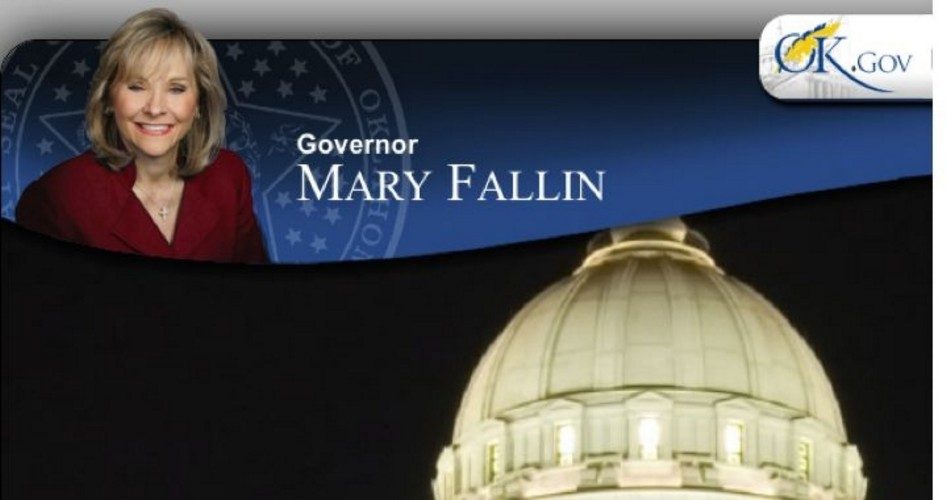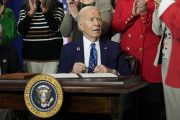
Payday lending is one of the most reviled businesses in society. Some American Christians even regard the practice as a sin. Probably even a majority of those who mouth their support for the “free market” favor government restrictions upon (if not the outright banning of) “payday lending.”
Therefore, it is not surprising that Oklahoma’s Republican Governor Mary Fallin recently vetoed a bill passed by the Oklahoma Legislature that would make minor reductions in government control over the practice.
In her veto message, Fallin stated, “House Bill 1913 adds yet another level of high interest borrowing (over 200 percent APR) without terminating or restricting access to existing payday loan products. In fact, I believe that some of the loans created by this bill would be MORE EXPENSIVE than the current loan options.” (Emphasis in original.)
This assertion that the annual percentage rate (APR) for a two-week payday loan is 400 percent (or some such ridiculous amount) is nonsensical, unless the borrower intends to pay a $200 loan back over the span of an entire year.
Under current Oklahoma law, a person may not borrow more than $1,000 from a payday lender. The bill vetoed by Governor Fallin would have permitted someone to borrow $1,500 more. Fallin considered this “stacking their liabilities for repayment on these high interest loans.”
Fallin noted that she had vetoed a similar bill to loosen restrictions on payday lenders in 2013 because she had “concerns with the frequency [that] low-income families in Oklahoma were using these lending options, and the resulting high cost of repayment to those families.”
In a recent poll by Morning Consult Governor Approval rankings, which polled 85,000 registered voters across the country in the first three months of the year, Fallin’s 41 percent rating made her the fifth-least popular governor in the country. Her approval marks in Oklahoma declined precipitously after she vetoed pro-gun rights and pro-life legislation during her second term.
While this most recent veto, which would have loosened the restrictions on payday lending in the Sooner State, is no doubt much more popular, this only demonstrates vividly that the principles of free enterprise and limited government are supported more in the abstract than they are in reality.
First of all, the language of Fallin’s veto message is deeply paternalistic. Under her reasoning, there are certain people in society who just cannot be trusted to make their own economic decisions, based on their own unique circumstances of being poor. This is reminiscent of the days when full-blood American Indians would have to get a white man to co-sign legal documents, even if the Native American was able to read them just fine for himself. In other words, the Indian was treated like a child, much like a poor person today, when it comes to payday lending.
Just how far should the state government go in managing the personal business affairs of its citizens? Considering that Governor Fallin wants to restrict the borrowing choices of “low-income families,” who will define “low-income?”
The truth is that any government price control is a lie. Government can no more repeal the laws of supply and demand — which determine the prices of products and labor (wages) and the price of money (interest rates) — than it can repeal the law of gravity. Government cannot make 2 + 2 = 5 by a law. If a price of interest rates, like any other price, is held below the market, it causes a shortage, and if held above the market, it causes a surplus. For example, increased minimum-wage laws have predictably led to a surplus of labor (unemployment) in certain businesses in Seattle, where they have been mandated by law. As Henry Hazlitt wrote in Economics in One Lesson, “There is no point in assuming a price control that would fix prices exactly where a free market would place them in any case. That would be the same as having no price control at all.”
Even some who understand this principle, and decry government price controls when it comes to goods and services, and minimum wages, somehow think the free market no longer applies when it comes to payday lenders and interest rates above some arbitrary level.
Barrett Duke, the vice president for public policy of the Southern Baptist Convention’s Ethics and Religious Liberty Commission, is in favor of capping interest rates at an annual percentage rate (APR) of 36 percent, the same as for federal loans to military members: “If it’s good enough for the military, that interest rate cap should good enough for everyone,” he stated.
Stephen Reeves, associate coordinator for partnerships and advocacy for the Cooperative Baptist Fellowship, said, “Christians widely agree that the laws and regulations should protect against expensive interest and loans that cannot be repaid.” It is amazing that Reeves would contend that payday lenders are making loans “that cannot be repaid,” since lenders could not stay in business if they made very many loans “that cannot be repaid.” Of course, Reeves is probably arguing that borrowers cannot pay back the entire loan all at once, because of the “excessive” interest rates.
But we should think about what would happen if these church leaders had their way and “government caps” were instituted on interest rates. In his book Defending the Undefendable, Walter Block asked his readers to “imagine the results of a law which prohibits usury, which can be defined as charging a rate of interest higher than the lawmaker approves of. Since the poor and not the rich pay the higher interest rate, the law would have its first effects on them. The effect would be to hurt the poor.” [Emphasis in original.]
In some cases, laws designed to “protect the poor” would make it impossible for them to borrow money at all.
While one could easily argue that it is not the proper role of government to determine any price, including the price charged on loans (interest), these types of laws, however popular, are also wrong from a practical standpoint.
In most cases, the loans are taken out for necessities of life — food, rent payments, electric bills, car payments — and if those seeking loans could have obtained the money another way, one would presume that they would have done so. Bluntly speaking, if the payday lender did not exist, the poor person might not be able to make a car payment in a particular month. Then, if a car is repossessed, the low-income person cannot get to work, and loses his job. That would be a greater concern than paying back $230 for a $200 loan. Similarly, a loan to pay the electric bill would be cheaper than getting the electricity reconnected, after the poor person has been sitting in the dark for several days.
It should be understood that these poor persons who take out payday loans are ordinarily huge credit risks. They often do not have collateral, so the lender must “trust” the borrower to pay back the loan. Mainstream lenders will not loan them any money at all. Block explains, “One is hardly a victim of a moneylender if one has agreed to repay a loan, and then reneges on the contractual promise. On the contrary, the moneylender is the victim of the borrower.”
If the interest rates charged by payday lenders were controlled below the true market price, then the payday lender would make fewer loans, and might even opt to do something else for a living. This will often leave the payday borrower with no options, unless some of those so strongly against payday lending choose to become payday lenders themselves and give low-income borrowers low-interest loans of say, one percent. Or if these opponents of payday lending are so much purer than the payday lenders, they could simply give these poor people the money to make their car payments.
Interestingly, Governor Fallin also advised legislators that future legislation dealing with payday lenders should seek advice from mainstream financial institutions. Really? If the mainstream financial institutions were making lower-interest loans to lower-income borrowers, then the low-income persons would not be going to payday lenders. Why should a business owner be able to have such influence over laws affecting other business owners? How is that a “free market?”
Such laws as those placing restrictions on payday lenders are promoted by politicians such as Oklahoma’s governor, and are accepted by a general public largely uninformed as to their actual effects. The expanse and use of these types of price control laws is fortunately limited. What is so dangerous about these laws is they leave the impression that government can, by decree, alter the natural workings of the free market in such a way as to benefit the public. Sadly, many will then conclude that since the free market does not work well for poor borrowers, or other supposedly special situations, perhaps we would be better off with no free market at all.
Barrett Duke of the Southern Baptist Convention hinted as much, when he stated that interest-rate caps should be in place “for everyone.” However, since all price controls have negative effects, spreading them throughout the economy would just spread those negative effects, where they would do even more damage to the economy — and our liberty.



